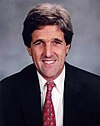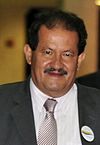2002 Santa Rosan presidential election
| |||||||||||||
| Turnout | 76.44% (first round) 74.05% (second round) | ||||||||||||
|---|---|---|---|---|---|---|---|---|---|---|---|---|---|
| |||||||||||||
| |||||||||||||
A presidential election was held in Santa Rosa on 20 April 2002, with a second round on 4 May.
Background
The Constitution of Santa Rosa states that the President of the Republic is elected to a four-year term in a two-round popular vote system. If no candidate achieves a majority in the first round, a second round takes place two weeks later consisting of the two highest performing candidates of the first round. The winner of the election takes office on 20 July of that year.
Candidates
Candidates in runoff
| # | Party/coalition | Presidential candidate | Political office(s) | Vice Presidential candidate | ||
|---|---|---|---|---|---|---|
 |
Bukar Breno Bellarosa | Mayor of Ciudad Beldad (1990–2002) |  |
Jefte Bonturi | ||
 |
Juan Donovan | Senator for Oseas (1994–2002) |  |
Benedetta Torres | ||
Candidates failing to make runoff
| # | Party/coalition | Presidential candidate | Political office(s) | Vice Presidential candidate | ||
|---|---|---|---|---|---|---|
| Danilo Gurundo | None |  |
Calisto González | |||
 |
Klaus Passenboofer | None |  |
Georgio Cambre | ||
Nominations
Socialist Party
This was the second presidential election that the Socialist Party of Santa Rosa (PSSR) had participated in and the first election to have primaries. The Socialist Party was the only party in the election to hold national primaries to select the party's nominee.
President Terence Cola, the incumbent and member of the PSSR, enjoyed very high approval ratings going in to his second term in 1998. However, he had stated on several occasions that he believed in term limits and would not seek reelection in 2002. The first candidate for the nomination, Senator Juan Donovan of Oseas, declared his candidacy on 12 June 2001. Donovan was often named in the media as a more moderate member of the Socialist Party and a close ally of Cola in the Senate. He supported gun control legislation, universal access to public healthcare, and enhanced environmental protections, as well as Santa Rosa's participation in international affairs.
The media speculated that Vice President Geraldo Gran Cebolla would challenge Donovan for the nomination, but Gran Cebolla chose to not run. Other candidates later declared, including Senator Benedetta Torres, Governor Godofredo Janz, labor activist Danilo Gurundo, and Minister of Justice Rino Tafani.
The first states voted on 21 October. After the first wave of primaries, Godofredo Janz took the lead with 100 delegates, followed by Danilo Gurundo at 95, Juan Donovan at 37, Benedetta Torres at 21 and Rino Tafani at 0. The three states where the primaries took place were historically populated by ethnic minorities and leftists, giving an edge to Godofredo Janz, a governor popular among both Black Santa Rosans and far-leftists.
However, former Patriarch Buenpensar Tshinga, who had a very famous spat with Janz a decade ago when the two were competing for the leadership of MOLAN, had been warning the Mbali Catholic faithful against the Governor. Tshinga purchased advertisements in several newspapers and TV stations providing quotes of Janz defaming the Church. Tshinga encouraged the faithful to support his "dear friend" Danilo Gurundo instead.
Both Benedetta Torres and Juan Donovan, the two major social democrats in the race, started slipping in the polls but ramped up their advertisement and ground game efforts. Their ads were mostly attacks against Janz and Gurundo, claiming them to be "extreme and unelectable."
Rino Tafani, who scored a distant last place, sought ways to pump life into his campaign. Though polls reported positive responses to his advertisements showcasing his experience in the Cola administration as the chief federal prosecutor, Tafani's fundraising base was extremely lackluster. His low-key and enigmatic personality hasn't helped his image either.
By the time of the next primaries a few days later, Tafani dropped out and endorsed Donovan. Godofredo Janz held the delegate lead at 206, closely followed by Danilo Gurundo at 195, Juan Donovan at 100, and Benedetta Torres at a distant 21.
Interest groups friendly with Juan Donovan and Benedetta Torres doubled down on their political attack ads against Godofredo Janz, attacking his past as a guerilla in the MOLAN organization. "When President Tito Pérez was signing the Labor Standards Act only 10 years ago, Godofredo Janz and his thug friends were hiding in the Amazon, trafficking drugs, and terrorizing civilians," a narrator said in one ad, while photos and videos were displayed of the Tanaj governor carrying a rifle and dressed in uniform as a member of the MOLAN over a decade ago.
Three more primaries took place less than a week later. Mbali Catholics, especially in Bahia Negra, heavily swayed the vote in the state of Cohélet, where Danilo Gurundo won a massive turnout, sweeping away 73 of the 111 delegates. Godofredo Janz faced a crushing last-place defeat in the state, thanks to ads posing the governor as an enemy of the Church.
Gurundo was then in the delegate lead at 321, followed by Juan Donovan at 268, Godofredo Janz at 206 and Benedetta Torres at 92. Torres decided to drop out afterwards and endorsed Donovan.
With the primary becoming a three-man race, several endorsements started flowing in. Two powerful unions in Santa Rosa, the Santa Rosan Auto Worker's Union and the Industrial Guild of Butchers, which represent a combined total of more than 5 million workers, endorsed Gurundo for president.
When primaries took place in Cisplata, Velasco, Esdras, Jueces, and Nahúm on 13 November, Danilo Gurundo swept away 168 delegates, bringing his total to 489. Donovan won 164, massively closing the gap by bringing him up to 432. Janz only won 55, bringing his total to 261. All three remaining candidates insisted they had a pathway to the nomination and did not foresee dropping out of the race any time soon.
Three more primary contests took place 10 days later in Salmos, Oseas, and Pedro today which turned the tide of the contest. Although Danilo Gurundo won a majority of delegates in Salmos, Juan Donovan was the only candidate to win more than 15% of the vote in Oseas and Pedro, walking away with every single one of those state's delegates.
Juan Donovan then had the lead at 726 delegates, followed by Danilo Gurundo at 506 and Godofredo Janz at 286. With only 412 delegates still at play and a majority of 1010 needed to win the convention, Juan Donovan was currently the only candidate who could win the majority through the next four primary contests alone. If Donovan failed to do so, then the convention would be contested.
However, Donovan went on win Santiago, Hechos, Levítico, and Ageo a week later, sweeping away most of the delegates to achieve a majority, thus becoming the Socialist Party's presumptive presidential nominee. President Terence Cola offered his congratulations and endorsement to the Senator and said he would campaign for him.
Democratic Party
Governor Mick Kennedy was leading talks as of November 2001 to merge the center-right and conservative political parties to form the Democratic Party of Santa Rosa.
The National Democratic Party, Democratic Party of Freedom, Party of National Unity, and Liberal Republican Party were the four largest right-wing parties in Santa Rosa and all fielded four different presidential candidates in 1998, with none of them achieving more than 14% of the popular vote.
Efforts had been made to unite the splintered right wing and take back control of the Congress and Presidency during the years of the Cola presidency, though nothing serious has ever taken off. With the creation of a unified front, the conservatives thought they would have a standing chance in the election.
In December the merger was made final. On January 4, the new Democratic Party announced Mayor of Ciudad Beldad Bukar Breno Bellarosa as their nominee.
Bellarosa, 51, was the three-term conservative independent Mayor of Ciudad Beldad, having succeeded Tito Pérez for that office in 1990. Prior to his election, Bellarosa amassed $9 billion as a prolific businessman, investor and industrialist in the city and surrounding areas. He was also an air force veteran having served from 1969 to 1975.
Independents and others
Danilo Gurundo
Danilo Gurundo announced he was running for president as an independent following his loss in the Socialist Party primary. He believed his insurgent showing in the primary had proven that he was a viable candidate for the presidency and wasn't willing to give up.
Results
| Candidate | Party | First round | Second round | |||
|---|---|---|---|---|---|---|
| Votes | % | Votes | % | |||
| Bukar Breno Bellarosa | Democratic Party | 62,916,370 | 44.95% | 82,669,286 | 60.98% | |
| Juan Donovan | Socialist Party | 50,079,801 | 35.78% | 52,907,483 | 39.02% | |
| Danilo Gurundo | Independent | 20,555,001 | 14.69% | |||
| Klaus Passenboofer | Party of National Unity | 6,414,663 | 4.58% | |||
| Valid votes | 139,965,835 | 99.05% | 118,402,871 | 99.04% | ||
| Invalid/blank votes | 1,344,658 | 0.95% | 1,313,402 | 0.96%% | ||
| Total | 141,310,493 | - | 136,890,171 | - | ||
| Registered voters/turnout | 141,310,493 | 76.44% | 136,890,171 | 74.05% | ||
This article is from APSIA 1.2. For the most recent iteration of APSIA, look at Category:APSIA 2.B |


